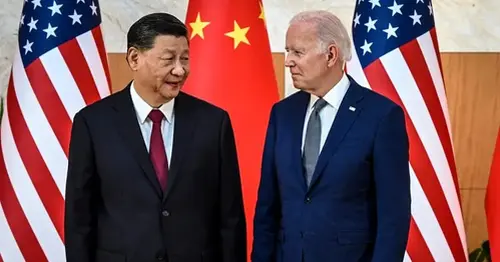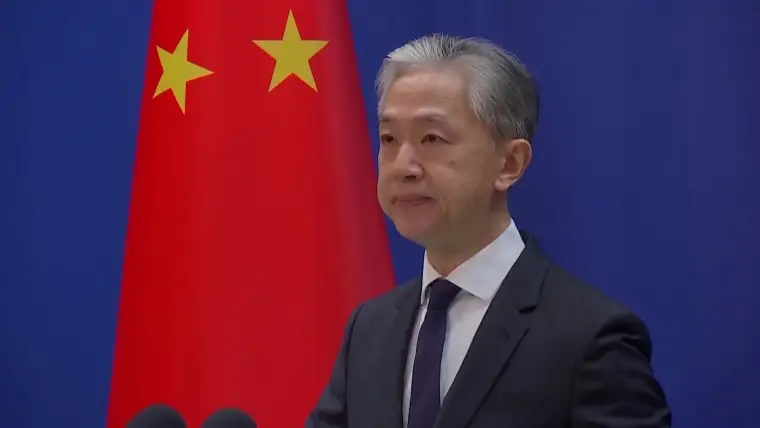
White House hopes Biden's relationship with Xi can defuse U.S.-China tensions
WASHINGTON — A thin thread may be all that’s preventing tensions between the U.S. and China from devolving even further — the personal relationship that President Joe Biden has cultivated over the past dozen years with his Chinese counterpart, Biden administration officials and foreign policy analysts said.
Now that Chinese President Xi Jinping has consolidated power and effectively ended collective rule, he’s the lone figure in Beijing making decisions that will drive future relations, according to U.S. officials who were granted anonymity to offer frank assessments of the relationship.
It is Xi who will decide whether China invades Taiwan; Xi who will determine whether China gives lethal arms to Russia in its war in Ukraine; Xi who will calibrate how hard to push North Korea into curbing a nuclear arms program that threatens the United States and its allies.
“The answer is China. Now what’s the question?” Jeremy Bash, a former CIA chief of staff, said on the country's role in global affairs as Xi starts another five-year term.
One question is whether the Biden administration can deter Xi from actions that put the two nations on a path to conflict. Biden often tells aides that when they speak publicly about China, they should stress the need to open lines of communication, a senior administration official said.
Yet because of Xi's dominance in China's system, the only conduit that truly matters in staving off catastrophe is the one that exists between the two presidents, administration officials and analysts say.
That's not a durable solution. Biden's term ends in less than two years, and if he chooses not to run again or loses re-election, his successor might have to build a relationship with Xi from scratch. Meantime, his rapport with Xi is under constant strain from the hard-line positions each country has staked out. Biden has kept in place the Trump-era tariffs that target China and has also imposed new export controls that prohibit the sale of sophisticated computer chips and high-tech equipment to the country.
U.S., U.K. and Australian nuclear sub deal is a threat to peace, China says
March 14, 202301:24"Biden says, 'We want competition but not conflict with China,'" said Daniel Russel, former director of Asian affairs in the Obama White House. "That sounds perfectly reasonable to you and me. But the way the Chinese hear that is if Biden were saying, 'I want to be up in your grill. I want to get in your face. I want to do all these things you vehemently object to and, by the way, I want that to be done with no risk to myself.'"
No one serving in the U.S. government is as familiar with Xi as Biden. He has spent days in face-to-face meetings with Xi dating back to when they were both vice presidents, giving him rare insight into the intentions and motivations of the most powerful Chinese leader since Mao Zedong.
An extravert to the core, Biden has long made personal diplomacy a centerpiece of his foreign policy doctrine. Chemistry matters.
“I know we make foreign policy out to be this great, great skill that somehow is sort of like a secret code,” Biden said in a news conference in 2021 after meeting with Russian President Vladimir Putin in Geneva. “All foreign policy is a logical extension of personal relationships. It’s the way human nature functions.”
Having gotten to know Xi, Biden hopes to use those insights to put the U.S. and China on a safer footing. A recent security assessment written by U.S. intelligence officials warns that China wants to build a "world-class military" capable of "offsetting perceived U.S. military superiority."
For his part, Xi believes the U.S. is bent on the “containment" of China.
A new military pact forged by the Biden administration underscores how differently the two nations see the world. Biden traveled to San Diego on Monday to announce a deal with Australia and the United Kingdom that stations nuclear submarines in Canberra in hopes of deterring Chinese aggression in the Pacific. But to Xi, the move might seem like a fresh example of America's "encirclement" and "containment" of China.
“In the system that’s currently configured in China … there’s an increasing sense that you have to be talking at the leader level to get decisions,” a second senior Biden administration official said.
“The president’s belief in the importance of bilateral personal relationships has been validated in the U.S.-China” dynamic, the official continued. “But it’s also our only option. There are no other venues where we can constructively engage deeply.”
Biden’s approach differs from that of his one-time running mate. Former President Barack Obama, more aloof and self-contained, never put as much stock in personal relationships as a means of governing. In his memoir, “A Promised Land,” he wrote about the nonexistent rapport he had with Xi’s predecessor, Hu Jintao. During one particularly leaden meeting with Hu in 2009, Obama wrote that he was “tempted more than once to suggest we could save each other time by just exchanging papers and reading them at our leisure.”
Biden isn’t one to swap memos and leave it at that. One mentor to him was Mike Mansfield, the former senator from Montana who later became U.S. ambassador to Japan. One of the lessons that Mansfield drummed into Biden was “how important it was to listen to what the other person had to say,” Russel, the former Obama administration official, said. “I had extensive conversations with Biden when he was vice president about personal diplomacy. … That’s very much in Joe Biden’s DNA and theory of foreign policy.”
As Obama’s vice president, Biden traveled to China in 2011 for a visit with Xi, who was understood to be a rising figure. After a set of formal meetings, they left the Chinese capital and went to Chengdu in the southwest, where they ditched the ties, took walks together and found themselves at one point on a high school basketball court.
“Some guy had a ball there and Biden picked it up and started shooting,” said Robert Wang, a former U.S diplomat who was on the trip. “He missed the first eight or nine shots and finally made it. Then, he turned around and gave the ball to Xi, and Xi shook his head. That’s it; he wouldn’t try it.”
“But Xi was smiling and he was affable,” he continued. “Clearly, Biden thought this was something he could do and maybe be effective at.”
Speaking through translators, they asked each other open-ended questions. Biden questioned Xi about what kept him awake at night, recalled Russel, who accompanied Biden on the trip. Xi asked about civilian control of the military in America and how the arrangement worked.
It would be stretching things to say that they developed a friendship; a wary respect might be more apt, according to officials who've watched them interact. When they met in Bali, Indonesia, in November for the summit of the Group of 20 leading economies, they would mention their time together in China 12 years earlier — not so much to warmly reminisce as to reinforce various points they were making, the second senior official said.
Biden views Xi “as very hard, unsentimental — a nationalist who believes in their version of Chinese exceptionalism,” the official added. “The president has said this both privately and on the record: There’s not a democratic bone in his [Xi’s] body.”
If nothing else, the relationship between the presidents might head off the sorts of misunderstandings between leaders that have triggered past conflicts, some analysts said.
“I’ve spoken to Biden about this: He is very proud of his relationship with Xi. I don’t think that leads to trust, but it does lead to a level of respect,” said Ian Bremmer, president of the Eurasia Group, a consulting firm. “Generally, the relationship [between the U.S. and China] is a bit more stable because Biden is there. I believe that.”
Others are dubious. Hard national interests, not a more amorphous personal connection, will ultimately control how the U.S. and China navigate a perilous time for both, some China-watchers say.
Former President Donald Trump tried a charm offensive of sorts. He invited Xi to his Mar-a-Lago resort in 2017 and served him a “beautiful” piece of chocolate cake. That didn’t make Xi any more transparent about the origins and spread of Covid-19 three years later.
Obama, hoping to loosen things up, invited Xi to a summit meeting at the Sunnylands resort in Southern California in 2013. They talked about their differences in formal meetings but also strolled the grounds together in shirtsleeves. Nonetheless, China defied the Obama administration's wishes by building military capabilities in the South China Sea.







